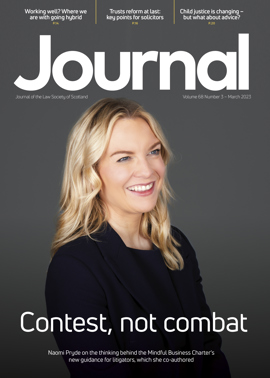Neutral evaluation: another resolution tool?

The cost and time in resolving a civil dispute can be prohibitive, especially where a court or tribunal decision is required, and can be difficult or impossible to predict for a client – as can the outcome.
There are so many variables: what witnesses actually say in evidence; unexpected objections, or rulings on objections; what the decision maker thinks of your case. The winner-takes-all approach to expenses makes running a case to full hearing a high-risk strategy. Even where it settles, uncertainty over outcome will make negotiations on expenses more complex.
Mediation is one option. But there is another way, which is growing in popularity: neutral evaluation (“NE”). This is sometimes known as early neutral evaluation (“ENE”), but this is a misnomer. While the earlier NE is used, the better, it can happen at any stage in the life of a claim.
How does it work?
Many of you will, from time to time, seek the help of a colleague when faced with a case that is proving hard to resolve, whether because of a headstrong client or simply because a fresh mind is needed.
Instead of seeking an informal opinion, NE allows you to obtain a formal assessment (evaluation) of your client’s case. The evaluator (legally qualified and trusted to be reasonable) has no connection with either party and provides an assessment of the merits, usually on paper, from essential documents (including any pleadings) and a briefing note.
Their report can assess the merits of legal arguments, based on evidence available, and note likely pitfalls should the case be adjudicated. If desired, they can make settlement suggestions.
A NE report carries several positives:
- a fresh mind is applied to the merits;
- your client has a safe “dry run” of the case, demonstrating how it might be resolved on adjudication;
- it can give you protection in the event of a negative outcome;
- it offers your client a reality check on prospects;
- it is not expensive or time-consuming;
- additional legal arguments could emerge; and
- it could break a negotiation logjam.
A further benefit is that it is confidential: the other party need not know that you ever received it. On the other hand, if the report is favourable, you could disclose it in seeking to apply pressure: “Here is what a respected neutral thinks of the case.”
A joint NE report is an option, but an obvious risk arises: if flaws in your client’s case are identified, the other party also receives the report.
ENE in England & Wales
The concept is not new in England & Wales, having been introduced into the Civil Procedure Rules in 2015 (rule 3.1(2)(m)) as a case management power for judges as evaluators. The mechanism has been discussed in case law (for example Telecom Centre (UK) v Thomas Sanderson [2020] EWHC 368 (QB); Seals v Williams [2015] EWHC 1829 (Ch); Lomax v Lomax [2019] EWCA Civ 1467). It is clear that the practice is gathering momentum in their courts.
Who to choose as evaluator?
In England & Wales, a judge is normally appointed. They will not, as a rule, be involved should the case be litigated further. One issue is that the judge can only produce a joint evaluation. As indicated above, that may not be ideal. The only way to obtain one for your own client is to commission it privately.
In the absence of a judicial scheme, ideally someone experienced as a resolver should be appointed. NE is not about getting a second opinion – it is about helping parties understand how a case might be resolved by someone performing a judicial role.
The evaluator’s remit
This must be framed carefully, and there are options.
If resolution of a particular contentious issue(s) would end the dispute, you could ask the evaluator to assess that issue(s) alone.
You could present a set of facts for the purposes of the report, even though certain facts are not agreed. Or, the evaluator’s views could be sought on the basis of more than one set of facts. Or you could refer the whole case, including disputed facts.
A further option is to ask the evaluator for any new arguments that the instructing party could advance. Strictly speaking, this is beyond a judicial assessment role, but in a privately instructed report there is no bar to this.
Finally, you could task the evaluator simply to consider the strengths and weaknesses of a party’s position. They could then be asked to comment also on possible settlement terms, framed in recognition of their assessment. Again, a judge-made NE would not do this.
Conclusion
Master McCloud in Telecom Centre explained that the NE function means that “positive or negative views as to merits are expressed, perhaps robustly”. That kind of analysis can be very valuable in cases where, if not settled, much time and money will be consumed, and you then face an unhappy client.
NE will not suit every dispute, but it is a tool available to you. Given its increase in popularity in England & Wales, it is fast becoming mainstream. It therefore ought to be considered when advising your client as required by Law Society of Scotland Guidance (B1.9, Dispute Resolution).
Perspectives
Features
Briefings
- Civil court: No rule against redaction
- Corporate: Privileged or confidential – who can access
- Intellectual property: Big tech, AI and enforcement
- Succession: Non face-to-face will instructions; form C1
- Agriculture: “Route map” for agricultural reform
- Parking: About this ticket…
- In-house: Caring for the carers







